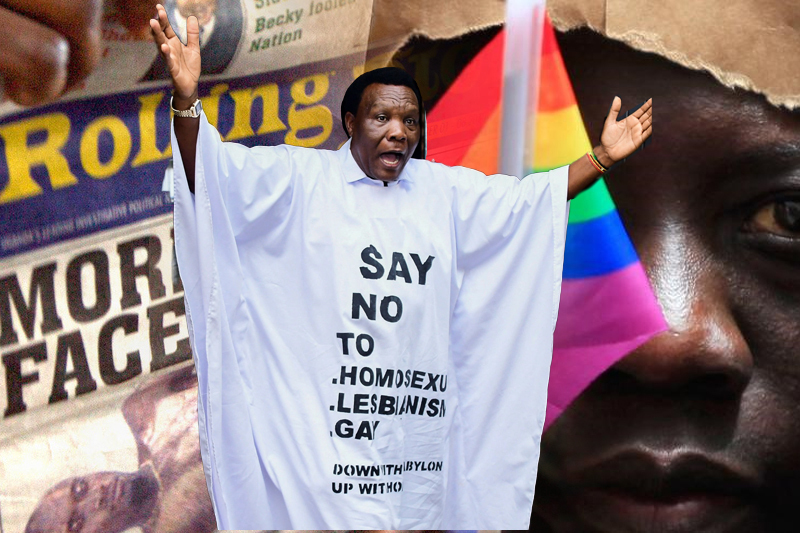

uganda’s new anti homosexuality law bans identification as lgbtq
The Ugandan parliament recently passed comprehensive anti-gay legislation that would criminalise anyone who identifies as LGBTQ and would impose severe new penalties on same-sex relationships.
The new law passed on Tuesday appears to be the first to outlaw merely identifying as lesbian, gay, bisexual, transgender, and queer (LGBTQ), according to Human Rights Watch, even though same-sex relationships are already prohibited in more than 30 African nations, including Uganda.
Anita Annet Among, the Parliamentary Speaker, declared “the ayes have it” and noted that the “bill passed in record time” after the final vote.
All but one legislator opposed the bill, and significant portions of the original draught law were changed. The strict legislation’s proponents argue that it is necessary to punish a wider range of LGBTQ activities because they are perceived as a threat to traditional values in the conservative and religious nation of East Africa.
President Yoweri Museveni will now receive the legislation to be signed into law.
Although Museveni has not addressed the current legislation, he has long been against LGBTQ rights and signed an anti-LGBTQ law in 2013 that was denounced by the West before being overturned by a domestic court for procedural reasons. The 78-year-old leader has consistently indicated, however, that he does not consider the matter to be a priority and would instead like to keep his positive relationships with Western donors and investors.
Politicians used homophobic language when discussing the bill in parliament, confusing it with adult same-sex relationships that are consensual.
“Our creator God is pleased with what is occurring,” During the discussion of the bill, legislator David Bahati stated, “I support the bill to protect the future of our children.
“This is about the sovereignty of our country. Nobody should threaten or blackmail us.”
The law forbids same-sex relationships as well as aiding and abetting homosexual behaviour as well as conspiring to engage in homosexual activity.
In addition to harsh penalties, violations of the law can result in death for so-called “aggravated” homosexuality and life in prison for gay sex. According to the law, aggravated homosexuality includes, among other things, having gay sex with minors or when a person is HIV positive.
Conspiracy theories that accuse mysterious international forces of encouraging homosexuality have gained traction on Ugandan social media in recent months.
The AFP news agency reported earlier this month that Frank Mugisha, executive director of Sexual Minorities Uganda, a prominent gay rights organisation whose operations were shut down by the government last year, had already received a deluge of calls from LGBTQ people regarding the new bill. “Community members are living in fear,” he said.
Human Rights Watch said the new law “would violate multiple fundamental rights guaranteed under Uganda’s Constitution and international human rights instruments to which Uganda is a party” in an opinion presented to a Ugandan parliamentary committee earlier this month.
Consensual same-sex behaviour being criminalised “contributes to a climate in which violence and discrimination against LGBT people is widespread,” the organisation claimed.
Six men were allegedly detained by police last week in the southern lakeside town of Jinja for “practising homosexuality,” according to police. According to the police, six more men were detained on the same charge on Sunday.
One of the most extreme aspects of the new bill, according to Human Rights Watch expert Oryem Nyeko, is that it criminalises people for simply being who they are and further restricts Ugandans’ already restricted freedoms of expression, association, and privacy.
He said Ugandan politicians should stop using LGBT people as a political pawn and instead concentrate on passing laws that safeguard marginalised groups and uphold fundamental rights.
British Steel has issued the layoff notice of 2,700 employees, giving the steelworkers great relief. With the UK government intervening…
According to Reuters energy major ConocoPhillips says it will cut staff as a major result of its $23 billion purchase…
According to a Bloomberg News report released recently, Intel will make heavy job cuts this week as its new leadership…
Swiss Solar Panel manufacturer Meyer Burger has rolled out a significant initiative of deducting the working hours for about 300…
A significant humanitarian act has been carried out by the government of Costa Rica for the 200 deported migrants from…
Blockades on the borders of the country are to be put in place on April 28 if they do not…
This website uses cookies.
Read More